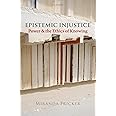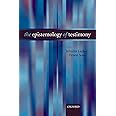One can disagree or agree with the brilliant arguments in this book, but one cannot ignore them. Tightly argued and fair minded, this is a model of philosophy engaging contemporary issues and scholarship meaningfully.

Download the free Kindle app and start reading Kindle books instantly on your smartphone, tablet or computer—no Kindle device required.
Read instantly on your browser with Kindle for Web.
Using your mobile phone camera, scan the code below and download the Kindle app.

Follow the author
Something went wrong. Please try your request again later.
OK
Epistemic Injustice: Power and the Ethics of Knowing Paperback – 28 September 2009
by
Miranda Fricker
(Author)
Sorry, there was a problem loading this page.Try again.
Or Pay with Zip. View 1 plan
The payment amount shown here does not include the cost of any additional services. See total payment amount (including shipping cost) at the checkout.
^Zip Pay: Minimum monthly repayments are required. A monthly account fee of $9.95 applies and is subject to change. Pay your closing balance in full by the due date each month and we’ll waive the fee. Available to approved applicants only and subject to completion of satisfactory credit check. Other charges may be payable. Fees and charges subject to change. T&Cs apply.
*Zip Money: Interest free term subject to minimum spend and promotional partner offer. Available to approved applicants only and subject to completion of satisfactory credit check. The repayment advertised will repay the transaction balance within the advertised interest free period. A monthly account fee of $9.95 applies and a one off establishment fee may apply for new customers. Under the contract, minimum monthly repayments are required and will vary depending on your credit limit. Instalment plans split eligible purchases of $300 and above into equal repayments within the interest free period. If you turn off instalments, transactions will be reverted to the minimum monthly repayment. Paying only the minimum monthly repayment may not necessarily repay a purchase within the interest free period. Any balance outstanding at the expiry of the interest free period will be charged at the standard variable interest rate, 25.9% per annum, as at 1 June 2023. Other charges may be payable, see T&Cs. Interest, fees and charges are subject to change. Terms & Conditions apply and are available on application. See your contract for further details. Credit provided by ZipMoney Payments Pty Ltd (ABN 58 164 440 993), Australian Credit Licence Number (441878).
You can select and apply an appropriate plan based on your cart value at checkout.
-
Pay at Your PaceZip
| Account type | Interest |
|---|---|
| Zip Pay | Always interest free^ |
| Zip Money | 6 mo interest free,
25.9% p.a. thereafter* |
^Zip Pay: Minimum monthly repayments are required. A monthly account fee of $9.95 applies and is subject to change. Pay your closing balance in full by the due date each month and we’ll waive the fee. Available to approved applicants only and subject to completion of satisfactory credit check. Other charges may be payable. Fees and charges subject to change. T&Cs apply.
*Zip Money: Interest free term subject to minimum spend and promotional partner offer. Available to approved applicants only and subject to completion of satisfactory credit check. The repayment advertised will repay the transaction balance within the advertised interest free period. A monthly account fee of $9.95 applies and a one off establishment fee may apply for new customers. Under the contract, minimum monthly repayments are required and will vary depending on your credit limit. Instalment plans split eligible purchases of $300 and above into equal repayments within the interest free period. If you turn off instalments, transactions will be reverted to the minimum monthly repayment. Paying only the minimum monthly repayment may not necessarily repay a purchase within the interest free period. Any balance outstanding at the expiry of the interest free period will be charged at the standard variable interest rate, 25.9% per annum, as at 1 June 2023. Other charges may be payable, see T&Cs. Interest, fees and charges are subject to change. Terms & Conditions apply and are available on application. See your contract for further details. Credit provided by ZipMoney Payments Pty Ltd (ABN 58 164 440 993), Australian Credit Licence Number (441878).
{"desktop_buybox_group_1":[{"displayPrice":"$49.53","priceAmount":49.53,"currencySymbol":"$","integerValue":"49","decimalSeparator":".","fractionalValue":"53","symbolPosition":"left","hasSpace":false,"showFractionalPartIfEmpty":true,"offerListingId":"FxfU4WNiCIrTude30dDVbSgzJxvxWLSfd5HyJbUUv5MBpGU9%2F%2FDXwMLwPP0CxtggJtvAb1JQz83IbodLxQBoFE7AEuL2FVZKZRgf9O8Wa2DqzAQ%2FkmH%2F2nJ5nNoKHz2KurOfejjiLB%2FjlZQXhKResx33YdTkIFIn","locale":"en-AU","buyingOptionType":"NEW","aapiBuyingOptionIndex":0}]}
Purchase options and add-ons
In this exploration of new territory between ethics and epistemology, Miranda Fricker argues that there is a distinctively epistemic type of injustice, in which someone is wronged specifically in their capacity as a knower. Justice is one of the oldest and most central themes in philosophy, but in order to reveal the ethical dimension of our epistemic practices the focus must shift to injustice. Fricker adjusts the philosophical lens so that we see through to the negative space that is epistemic injustice. The book explores two different types of epistemic injustice, each driven by a form of prejudice, and from this exploration comes a positive account of two corrective ethical-intellectual virtues. The characterization of these phenomena casts light on many issues, such as social power, prejudice, virtue, and the genealogy of knowledge, and it proposes a virtue epistemological account of testimony. In this ground-breaking book, the entanglements of reason and social power are traced in a new way, to reveal the different forms of epistemic injustice and their place in the broad pattern of social injustice.
- ISBN-100199570523
- ISBN-13978-0199570522
- Edition1st
- PublisherOxford University Press, USA
- Publication date28 September 2009
- LanguageEnglish
- Dimensions1.08 x 14 x 21.6 cm
- Print length198 pages
Female authors
Books written or inspired by women See more
Frequently bought together

This item: Epistemic Injustice: Power and the Ethics of Knowing
$49.53$49.53
In stock
$74.33$74.33
Get it as soon as Friday, May 23
In stock
Total Price: $00$00
To see our price, add these items to your cart.
Try again!
Added to Cart
Add all 3 to Cart
Choose items to buy together.
Customers who viewed this item also viewed
Page 1 of 1 Start againPage 1 of 1
Product description
Review
"Overall, Epistemic Injustice is an exciting examination of a widespread problem that is rarely discussed in such terms so that it can be understood and communicated, and perhaps, someday, solved."--Feminist Review"An original and stimulating contribution to contemporary epistemology.... There is much to admire in Fricker's book. It is clear, well-written and well-structured. The explanations and arguments are rigorous without being overly technical, and the illustrations are interesting and felicitous. In particular, the book constitutes a striking example of how contemporary epistemology can be enriched by a close attention to our experiences, and of how our understanding of epistemic matters can be deepened through the deployment of ideas from ethics, plitical theory and feminist philosophy. As a result, Epistemic Injustice makes a significant contribution, not just to epistemology, but to all of the disciplines."--Michael Brady, Analysis Reviews"In this elegant and ground-breaking work, Fricker names the phenomenon of epistemic injustice, and distinguishes two central forms of it, with their two corresponding remedies. As the title conveys, Fricker is working in the newly fertile borderland between theories of value and of knowledge. We are social creatures-something that tends to be forgotten by traditional analytic epistemology. We are also knowers-something that tends to be forgotten by power-obsessed postmodern theorizing. Fricker steers a careful passage between the Scylla of the one and the Charybdis of the other. . . . The book is not only a wonderful, ambitious attempt to bring ethics and epistemology together in a way that has rarely been done before, it is also a beautiful, and powerful, attempt to name something that matters. What progress, to be able to name the enemy, be it sexual harassment or epistemic injustice!" --Rae Langton, Hypatia"bold and well-argued . . . rich and elegantly written . . . Anyone whose philosophical interest in the concept of knowledge extends beyond merely definitional issues, and addresses its ethical and political dimensions as well as its genealogy, can ill afford to ignore this book" -- Axel Gelfert, Times Literary Supplement
"Miranda Fricker's excellent monograph occupies some relatively uncharted philosophical territory, being 'neither straightforwardly a work of ethics nor straightforwardly a work of epistemology', but instead seeking to '[renegotiate] a stretch of the border between these two regions'...her discussion is outstandingly lucid and persuasive...the book is an admirable reminder of what can be accomplished in under two hundred pages of crisp yet free-flowing philosophical prose. It deserves, and will surely command, widespread attention." --Sabina Lovibond, Philosophy
"excellent and well argued . . . This is an important and timely book, argued with care and illustrated with detailed and compelling examples . . . an exemplary discussion of the intersection of knowledge and power." --Kathleen Lennon Philosophical Quarterly
"This is a wonderful book not just for social or feminist epistemologists, but for the discipline as a whole. Fricker succeeds admirably in achieving her main goal of offering a detailed and wide-ranging ethical and epistemological analysis of testimonial injustice . . . Moreover, the book is beautifully written" --Martin Kusch, Mind
"In this elegantly crafted book, Miranda Fricker's timely project of 'looking at the negative space that is epistemic injustice' comes to fruition...this is a path-breaking study." --Lorraine Code, Notre Dame Philosophical Reviews"In an often gripping manner, Fricker cuts across philosophical subdisciplines in order to expose some of the more sinister aspects of our epistemic practices. For anyone interested in ethics, epostemology, or social and political philosophy, this is surely a must-read." --Francesco Pupa, Metaphilosophy
"Miranda Fricker's excellent monograph occupies some relatively uncharted philosophical territory, being 'neither straightforwardly a work of ethics nor straightforwardly a work of epistemology', but instead seeking to '[renegotiate] a stretch of the border between these two regions'...her discussion is outstandingly lucid and persuasive...the book is an admirable reminder of what can be accomplished in under two hundred pages of crisp yet free-flowing philosophical prose. It deserves, and will surely command, widespread attention." --Sabina Lovibond, Philosophy
"excellent and well argued . . . This is an important and timely book, argued with care and illustrated with detailed and compelling examples . . . an exemplary discussion of the intersection of knowledge and power." --Kathleen Lennon Philosophical Quarterly
"This is a wonderful book not just for social or feminist epistemologists, but for the discipline as a whole. Fricker succeeds admirably in achieving her main goal of offering a detailed and wide-ranging ethical and epistemological analysis of testimonial injustice . . . Moreover, the book is beautifully written" --Martin Kusch, Mind
"In this elegantly crafted book, Miranda Fricker's timely project of 'looking at the negative space that is epistemic injustice' comes to fruition...this is a path-breaking study." --Lorraine Code, Notre Dame Philosophical Reviews"In an often gripping manner, Fricker cuts across philosophical subdisciplines in order to expose some of the more sinister aspects of our epistemic practices. For anyone interested in ethics, epostemology, or social and political philosophy, this is surely a must-read." --Francesco Pupa, Metaphilosophy
Review
`Review from previous edition Bold and well-argued... [a] rich and elegantly written study... Anyone whose philosophical interest in the concept of knowledge extends beyond merely definitional issues, and addresses its ethical and political dimensions as well as its genealogy, can ill afford to ignore this book' Axel Gelfert, Times Literary Supplement
Book Description
A fascinating exploration of the relationship between knowledge and power.
From the Publisher
Miranda Fricker is Reader in the School of Philosophy at Birkbeck College, University of London
About the Author
Miranda Fricker is Reader in the School of Philosophy at Birkbeck College, University of London
Product details
- Publisher : Oxford University Press, USA
- Publication date : 28 September 2009
- Edition : 1st
- Language : English
- Print length : 198 pages
- ISBN-10 : 0199570523
- ISBN-13 : 978-0199570522
- Item weight : 240 g
- Dimensions : 1.08 x 14 x 21.6 cm
- Best Sellers Rank: 24,715 in Books (See Top 100 in Books)
- 3 in Epistemology Textbooks
- 19 in Ethics Textbooks
- 22 in Epistemology (Books)
- Customer Reviews:
About the author
Follow authors to get new release updates, plus improved recommendations.

Discover more of the author’s books, see similar authors, read book recommendations and more.
Customer reviews
4.7 out of 5 stars
4.7 out of 5
153 global ratings
How are ratings calculated?
To calculate the overall star rating and percentage breakdown by star, we don’t use a simple average. Instead, our system considers things like how recent a review is and if the reviewer bought the item on Amazon. It also analyses reviews to verify trustworthiness.
Top reviews from Australia
There are 0 reviews and 1 rating from Australia
Top reviews from other countries
-
 David65Reviewed in Italy on 19 March 2023
David65Reviewed in Italy on 19 March 20235.0 out of 5 stars Bene
Verified PurchaseBene
 DanReviewed in Canada on 15 October 2023
DanReviewed in Canada on 15 October 20235.0 out of 5 stars Amazing and very timely
Verified PurchaseI have struggled to understand societal privilege and systemic ‘isms (racism, sexism, etc). While not the explicit goal of this book it has given me a fundamental understanding of these topics that I was lacking and I am much better for that.
 Matthew WeaitReviewed in the United Kingdom on 24 July 2014
Matthew WeaitReviewed in the United Kingdom on 24 July 20145.0 out of 5 stars This is a truly excellent discussion of a critically important area in philosophy
Verified PurchaseThis is a truly excellent discussion of a critically important area in philosophy. Linking epistemology and ethics. Miranda Fricker explores the ways in which our presuppositions about people as individuals, and as members of communities, impacts the credibility we afford their knowledge. It should be read by lawyers and judges especially. (I should add that I am a former colleague of Miranda's, and a big fan of her work; but this review is of the text, not of her!).
 Kindle CustomerReviewed in Germany on 30 July 2019
Kindle CustomerReviewed in Germany on 30 July 20195.0 out of 5 stars Epistemology from a different point of view
Verified PurchaseThe book focuses on injustuce which is related to knowledge, or rather human interactions and societal structures involving the exchange of knowledge. It identifies two main problems: testimonial injustice, where one discredits testimony on the basis of the speaker's social group, and heuristic injustice, where the speaker's claim is dismissed on the grounds that the speaker is unintelligible or irrational.
The intersection of ethics and epistemology is fascinating. I recommend this book to anyone interested in either of those disciplines. The book also discusses models of virtue epistemology and discusses how epistemic injustice can be tackled.












